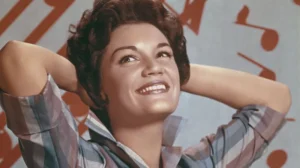American pop icon Connie Francis, whose 1962 track “Pretty Little Baby” recently went viral more than six decades after its release, has passed away at the age of 87.
Her death was confirmed by her longtime friend and publicist Ron Roberts, who announced the news “with a heavy heart and extreme sadness” in a Facebook post.
Francis had been hospitalized for pelvic pain due to a fracture, during which she was diagnosed with pneumonia. She died on the evening of Wednesday, July 16, 2025, following a short illness.
Though Connie Francis was most known in the mid-20th century, she experienced a resurgence in 2025, thanks to the viral success of “Pretty Little Baby”, originally released as a B-side in 1962.
The soft ballad went viral on TikTok in early 2025, with millions of users including celebrities like Kim Kardashian, Kylie Jenner, and ABBA’s Agnetha Fältskog using it to soundtrack videos featuring loved ones and pets.
One TikTok clip, featuring influencers Brooke Monk and Sam Dezz, garnered over 158 million views.
In an interview with People magazine in June, Francis admitted she had forgotten the track:
“To tell you the truth, I didn’t even remember the song!” she said. “To think that a song I recorded 63 years ago is touching the hearts of millions is truly awesome.”
Speaking to The News Chronicle, a content creator said of the singer “To be honest, I never knew who she was, I only knew the song [Pretty Little Baby] after several influencers started using it on their videos. She was such a great singer, she lived a long life, I hope she’s in a better place.”
Who was Connie?
Born Concetta Rosemarie Franconero on December 12, 1937, in Brooklyn, New York, Connie Francis from a working-class Italian-American.
Her father encouraged her to play the accordion by age 3. She later adopted the stage name Connie Francis as she broke into television and eventually the music scene.
Her big break came in 1958 with a cover of the 1923 standard “Who’s Sorry Now?”, which became a massive hit after Dick Clark featured it on American Bandstand. From there, her career exploded. She became known for both her upbeat pop hits like “Lipstick On Your Collar”, “Vacation”, and “Stupid Cupid”, and ballads like “Don’t Break the Heart That Loves You”.
In total, Francis sold over 40 million records, including 35 Top 40 hits, 16 of which reached the Top 10. She was the first woman to top the Billboard Hot 100 and recorded in over a dozen languages.
Sadly, in 1974, she was raped at knifepoint in a motel after a concert in New York. The trauma led to severe depression and institutionalization, much of which she claimed was forced upon her by her father.
At one point, she attempted suicide with sleeping pills, but was saved by her adopted son Joey, whose innocent knock on the bathroom door reminded her of her worth.
“I was looking at this bottle of sleeping pills… and my son knocked at the door of the bathrooom and he said, ‘Mommy, you’re the best mommy I ever had’,” she told Terry Wogan during a BBC One show in 1989.
“And that was it. I took the pills and threw them right down the toilet.“
She later sued and won $1.5 million from the motel chain for negligence. In 1981, she began performing again after undergoing surgery to repair damage to her voice.
However, tragedy struck again when her brother, George Franconero, was murdered in 1981 after testifying against the Mafia. The trauma worsened her mental health struggles, and she was later diagnosed with bipolar disorder.
Despite her sour experiences, Francis emerged as a passionate advocate for mental health and crime victims, working with groups like Women Against Rape and Mental Health America.
In her later years, Francis published a second memoir, Among My Souvenirs (2017), and officially retired in 2018, though she occasionally appeared at fan events and performances. In her words:
“I often say, I’d like to be remembered not for the highs I’ve reached but for the depths from which I’ve risen.”
In an interview in 2010, Connie said about her life and career, “With the exception of my brother’s murder, I’d do it all over again.”
“Because although there were some terrible lows, there were also exhilarating highs that I would have never felt in any other profession.”




